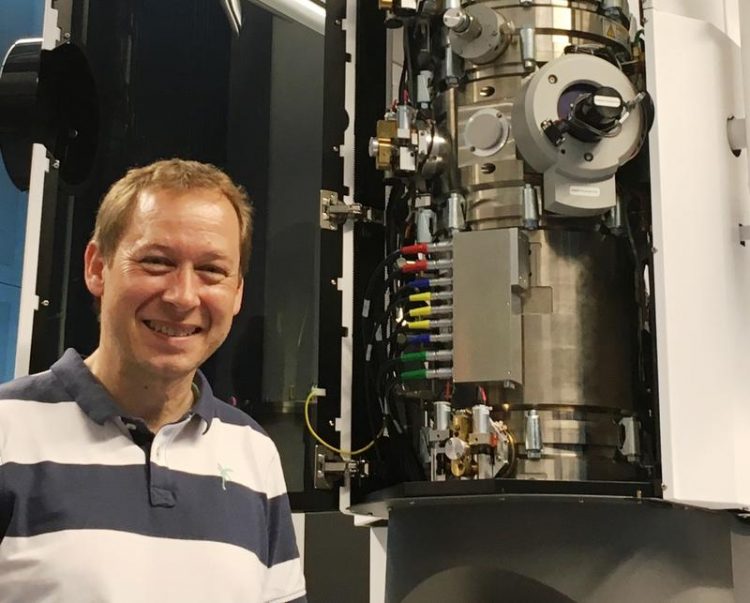Advanced Grant for Grain Boundary Phase Transformations

The European Research Council granted Prof. Gerhard Dehm with an Advanced Grant of 2.5 million euros for his project about grain boundary engineering Nicolas Peter, Max-Planck-Institut für Eisenforschung GmbH
Grain boundaries separate the individual crystals composing a material and are omnipresent “defects” in most functional and structural materials. While they are known to strongly influence the electrical, magnetic, thermal or mechanical properties of materials, surprisingly little is known on grain boundary phases, their transitions and how they can be applied to advance materials’ design.
This is in stark contrast to bulk and surfaces phases and their transitions – i.e. changes in the arrangements of atoms in the volume or at the surface of materials – where thermodynamic and atomistic concepts are well established since a long time.
This lack of a complete exploration of grain boundaries is due to their structural and chemical complexity, their defects and previously, insufficient characterization techniques. Prof. Gerhard Dehm, director at the Max-Planck-Institut für Eisenforschung (MPIE), is going to tackle these challenges.
He is now supported by an Advanced Grant of 2.5 million euros by the European Research Council (ERC) for his project on grain boundary phase transitions and their impact on properties, which will be key for grain boundary engineering.
The complexity of grain boundaries lies in their multidimensional space and defects. To overcome this complexity and establish phase diagrams for grain boundaries, Dehm and his team will focus on thin films of Cu and Al alloys. Thin films allow a hierarchical strategy analysing first bicrystalline, then oligocrystalline and finally polycrystalline thin films thus getting step by step into the multidimensional space of grain boundaries.
Thereby, the MPIE facilities provide advanced correlated atomic resolved spectroscopy and microscopy, and computational approaches to identify grain boundary phases and their relation to functional properties. Moreover, Dehm will use in situ micromechanical studies to interlink grain boundary phases and mechanical properties.
Grain growth experiments coupled with microscopy techniques such as electron backscatter diffraction and scanning electron microscopy will allow extracting changes in mobility of individual grain boundaries due to phase transitions in a high throughput approach. The project aims to predict and resolve grain boundary phase transitions, to establish guidelines for them, to correlate them with property changes and finally to provide design criteria for grain boundary engineering.
This could be particularly interesting for applications in the field of power electronic devices as employed for autonomous cars or energy applications. The usually used copper-based metallic contacts in power electronic devices could be made more robust and highly reliable by tuning the damage resistance of grain boundaries.
Dehm studied materials science in Erlangen (Germany) and did his doctorate 1995 at the Max-Planck-Institut für Metallforschung in Stuttgart (Germany). Before joining the Montanuniversität Leoben (Austria) as professor and head of the Department of Materials Physics and director of the Erich Schmid Institut für Materialwissenschaft of the Austrian Academy of Sciences in 2005, he continued his research as a group leader in Stuttgart and had a research stay at the Technion in Haifa (Israel). Dehm joined the MPIE in 2012 as executive and director of the department “Structure and Nano-/Micromechanics of Materials”.
The grants of the European Research Council are regarded as one of the most prestigious international research grants. 2167 proposals were submitted European wide in this application round whereby 269 scientists were successful. The ERC has given in total six advanced grants to scientists of the Max Planck Society.
Prof. Gerhard Dehm
dehm@mpie.de
https://www.mpie.de/3805345/news_publication_12078364?c=2914286
Media Contact
All latest news from the category: Awards Funding
Newest articles

Making diamonds at ambient pressure
Scientists develop novel liquid metal alloy system to synthesize diamond under moderate conditions. Did you know that 99% of synthetic diamonds are currently produced using high-pressure and high-temperature (HPHT) methods?[2]…

Eruption of mega-magnetic star lights up nearby galaxy
Thanks to ESA satellites, an international team including UNIGE researchers has detected a giant eruption coming from a magnetar, an extremely magnetic neutron star. While ESA’s satellite INTEGRAL was observing…

Solving the riddle of the sphingolipids in coronary artery disease
Weill Cornell Medicine investigators have uncovered a way to unleash in blood vessels the protective effects of a type of fat-related molecule known as a sphingolipid, suggesting a promising new…





















